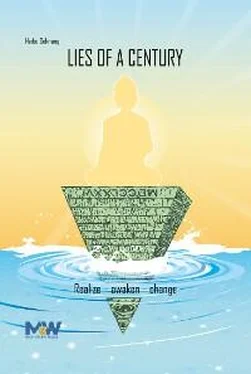In doing so, they misled the European Office of Statistics Eurostat in order to hide the real budget deficit only to make it re-appear once Greece was accepted into the Euro Zone.
In well-informed circles it is assumed that Goldman Sachs not only helped Greece, but also Italy to hide parts of its national debt in order to comply with the admission requirements of the Euro Zone. It is alleged to have been Draghi, the current head of the European Central Bank, and in the case of Greece, its Prime Minister Papadimos. In this time frame, the President of the Bilderberger Conference of 2011, EU Commissioner and head of the CFR, Mario Monti, succeeded the former Italian PM Silvio Berlusconi in his office.
There is one thing connecting the three men, the common former employment for the investment bank Goldman Sachs and the common goal of an EU fiscal union in which national sovereignty no longer exists.
Mario Draghi for example was at Goldman Sachs (Europe), Vice President and Head of the department that shortly before he was heading it, helped Greece sugarcoat its balance sheet with a financial instrument called Swap[60], in order to conceal its national debt.
In order to reach their goals, Goldman Sachs continued to place its own people in high offices time and time again.
Romano Prodi for example was a consultant at Goldman Sachs, prime minister of Italy and later president of the European Commission.
In that time of cover-up maneuvers by Goldman Sachs, the man who was presented as a beacon of hope for the Greeks by the lobby, Loukas Papadimos, was the governor of the Greek national bank.
The fact that Mario Draghi got the blessing of the Members of the European Parliament (MEPs) was appointed as Head of the European Central Bank could be seen as the greatest coup of Goldman Sachs in Europe. The entanglement of their interests with politics is quite obvious. Bush’s Finance Minister Hank Paulson as well as Clinton’s Finance Minister Robert Rubin both came from Goldman Sachs. Obama’s Finance Minister Timothy Geithner and his Secretary of Commerce Robert Hormats also belong to the chosen few who at one point used to work for Goldman Sachs. Not to forget that Robert Zoellick, President of the World Bank was once a Director at Goldman Sachs.
The former leaders of Goldman Sachs, who are partly to blame for the worst excess in the world of finance, are now appointed to solve the financial crisis. They impose austerity measures on their population that are supposed to be inevitable. One should be allowed to wonder whether they really are the right people to solve the crisis or whether we appointed the arsonists to act as the fire department.
Critics accuse the European lobby network of the US bank Goldman Sachs that it operates like a type of free mason lodge. To varying degrees the new president of the European Central Bank Mario Draghi, Italy’s head of state Mario Monti and Greek’s head of the transitional government Loukas Papadimos are figureheads of this tightly knit network.[61]
Since the establishment of the FED in 1913 governments came and went, Goldman Sachs as one of the co-founders of the FED remained and stands for the best money making machine that has ever come out of global capitalism.
Goldman Sachs is a financial empire on the sunny side that through their limitless greed for profits has turned the world into a giant casino. This even happens in the name of god, as Goldman Sachs head Blankfein phrased it: “I am merely a banker doing god’s work? [62]
Their god seems to be after more and more money. Driven by their insatiable greed for profit, they do business with anyone, no matter whether it is friend or foe.
| GOLDMAN SACHS: |
|
| Hank Paulson: |
Former Finance Minister of the USA, former CEO of Goldman Sachs |
| Christopher Cox: |
Formerly worked at Goldman Sachs, now Head of the SEC |
| Lloyd Blankfein: |
CEO of Goldman Sachs |
| Mario Draghi: |
Former VP at Goldman Sachs International, 2006-2011 President of the Italian National Bank, since November 2011 President of the European Central Bank |
| Loukas Papadimos: |
Formerly worked at Goldman Sachs, former Greek Prime Minister and former VP of the European Central Bank |
| Mario Monti: |
Formerly Goldman Sachs, Italian Prime Minister |
| Robert Rubin: |
Formerly Goldman Sachs, Finance Minister under Clinton, Advisor to Timothy Geithner |
| Timothy Geithner: |
Formerly Goldman Sachs, US Finance Minister |
| Robert Hormats: |
Formerly Goldman Sachs and Secretary of Commerce under Finance Minister Timothy Geithner |
| Robert Zoellick: |
Director at Goldman Sachs – former President of the World Bank, was part of both Bush administrations, Senior and Junior |
| Alexander Dibelius: |
German Head of Goldman Sachs and Advisor to Chancellor Angela Merkel |
| Peter Sutherland: |
Works in international business affairs at Goldman Sachs, former EU Commissioner |
| Petros Christodoulou: |
Formerly Goldman Sachs, now Head of the Greek Debt Office |
| Charles de Croisset: |
Formerly Goldman Sachs, supervises the French equivalent of the SEC |
| Mark Patterson: |
Lobbyist for Goldman Sachs and Advisor to Timothy Geithner |
| E. Gerald Corrigan: |
Former Head of the FED and Goldman Sachs |
| Otmar Issing: |
“International Advisor” to the US investment Bank Goldman Sachs, former Chief Economist of the European Central Bank |
| All of them were employed either directly at or as advisors to Goldman Sachs |
THE FINANCING OF THE NAZIS
„Profit rules the world”
Aristophanes (some time between 450 and 444 B.C. – 380 B.C.)
When it comes to dealing with one’s own past, Germany is not a contender for first place. In the last ten years you were able to witness that not one day has passed where the media did not in one form or another were talking about the time between 1933 and 1945. One could easily get the impression that the whole of German history took place in those 12 years alone.
It is interesting to note that even the smallest details are reported, but not about how Hitler rose to power and Germany’s arms build-up was financed at the time. The names that we hear in the media are usually limited to German companies like Thyssen, Krupp, Flick, etc. Was the Nazi economic miracle between 1933 and 1939 even possible? In other words the surface is treated to a high gloss polish, but the core of the issue is never ever discussed. In any case it should be obvious that no indebted nation in the world is in the financial position to continue a path of war for very long. Any country intending to go to war needs to turn to international bankers in order to obtain the funds required for such undertakings. This was no less true back then than it is at present.
Due to the Treaty of Versailles and the associated terms imposed on Germany, it was highly indebted and had to pay enormous sums in reparations to its neighbors. In the end this led to the collapse of the German currency and in its last consequence to the chronic inflation in the year 1923. The international bankers fell over themselves to help out by implementing the DAWES Plan[63] and the YOUNG Plan[64] and transferring huge amounts of money to Germany in 1924. Without these loans it would have been impossible for Germany to build up a war machine of such gigantic proportions. Professor Carroll Quigley, historian at Georgetown University in Washington, D.C. reported:
„It is notable that this system (The Daves and Young Plans) were implemented by the international bankers and that the lending of these funds to Germany has been extremely profitable.”
Читать дальше












